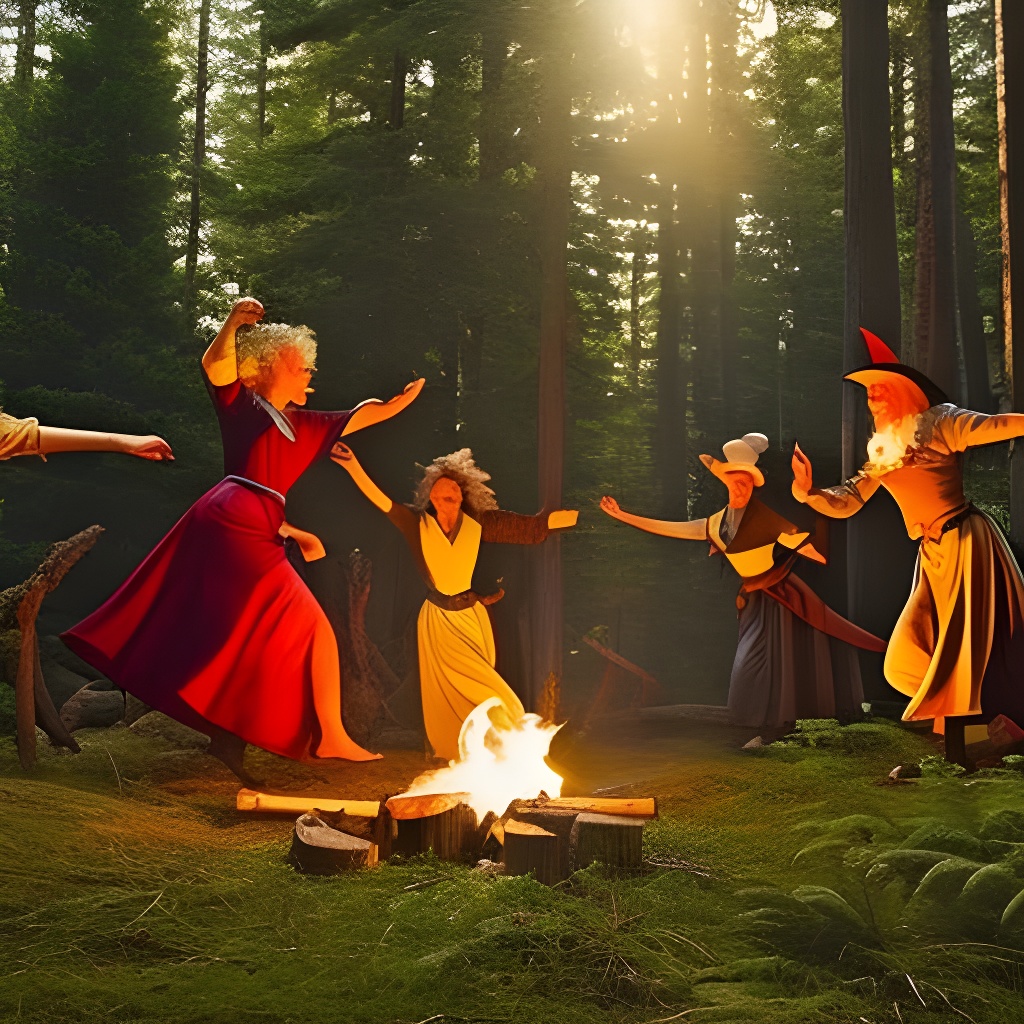
The above image was made with stable diffusion using the prompt 'witches dancing around a fire in the forest.'
I write a lot about freedom. Freedom is our natural state and society impinges upon this natural state in far too many ways. But freedom on its own is abstract and meaningless. For it to mean something, it must have purpose.
From my perspective, the purpose of freedom is that it allows us to meet our obligations. Every one of us exists within a vast web of obligations that can only be effectively navigated when we're free to make choices about how we use our energy. These obligations are personal, familial, social, professional, civic, environmental, and for some religious. The total network of these obligations is the glue that holds society together.
Not everyone can meet their obligations on all of these different levels all of the time. Sometimes the reason for the failure is out of a person's hands, like illness. Other times, the reason for the failure is more of a choice, like a bad attitude. There are even those who view freedom itself as freedom from obligations. These people make everything worse and are rarely held accountable for their actions.
Our control regime has arranged our legal and economic systems in such a way as to shield powerful bad actors from accountability. And most of our informal accountability structures have disappeared as society has become more diverse and we've become more atomized. Many sense that the absence of these structures is problematic. I suspect that this sense motivates cancel culture, which attempts to reintroduce personal accountability into society in a variety of misguided and harmful ways.
Imagine
Imagine a society where everyone was both perfectly free and entirely accountable. That's where I start when I try to picture a better future. The great challenge of this, of course, is that large swaths of our population barely understand their obligations to themselves, and can't even conceive of the other areas where they're obliged to behave in a responsible way.
Society's main strategy for dealing with these people has been to impose increasingly authoritarian controls on all of us. Living under these authoritarian controls has programmed most people to lose their innate sense of freedom and to consider their obligations burdensome, if they consider them at all. It's a sad state of affairs.
Sad, but not hopeless. Deprogramming the masses might be unrealistic, but this is an area where individual actions can make a big difference. Anyone can get clear about their obligations and then take reasonable steps to meet them. Anyone can be unrepentantly free within whatever constraints society has imposed upon them.
Every person who does these things provides an example for others to follow. An example of functional freedom. Of freedom with purpose. Once enough people are living in purposeful freedom, it'll become much easier to begin talking about accountability in more than a punitive sense.
Read my novels:
- Small Gods of Time Travel is available as a web book on IPFS and as a 41 piece Tezos NFT collection on Objkt.
- The Paradise Anomaly is available in print via Blurb and for Kindle on Amazon.
- Psychic Avalanche is available in print via Blurb and for Kindle on Amazon.
- One Man Embassy is available in print via Blurb and for Kindle on Amazon.
- Flying Saucer Shenanigans is available in print via Blurb and for Kindle on Amazon.
- Rainbow Lullaby is available in print via Blurb and for Kindle on Amazon.
- The Ostermann Method is available in print via Blurb and for Kindle on Amazon.
- Blue Dragon Mississippi is available in print via Blurb and for Kindle on Amazon.
See my NFTs:
- Small Gods of Time Travel is a 41 piece Tezos NFT collection on Objkt that goes with my book by the same name.
- History and the Machine is a 20 piece Tezos NFT collection on Objkt based on my series of oil paintings of interesting people from history.
- Artifacts of Mind Control is a 15 piece Tezos NFT collection on Objkt based on declassified CIA documents from the MKULTRA program.
It would be nice if people accepted their part in an event instead of putting all the responsibility onto others. This does two things.
You are quite right.
Wow. I'm amazed by your clarity and articulation with freedom, which I've always experienced as an abstract, complex term. You break it down so well here in ways that helps me understand what freedom really means in a society like ours.
I also feel like freedom is a deeply embodied experience as opposed to a material goal. Yes, we may push for policies, laws, and structures that support individual and collective freedom. Yet if freedom is a natural state of being, it has to be felt through our body as well. Every time I've felt a sense of individual freedom, my body and feeling states were involved whether it was through joy, grief, rage, moving through fear. Many of society's dysfunction comes from the collective disconnection from body intelligence and knowing.
Reminds me of Prentis Hemphill's work on Choosing Belonging:
Hey thanks! You're totally right that freedom has a bodily felt-sense aspect to it. I feel like some people have an easier time tuning into this than others.
Nice quote: )
It's true that some people can tune into this reality more than others. Collective efforts to get people connected with their bodies seems to be a good first step in deprogramming the masses. I feel like our institutions like our public schools are attempting to do this with the normalization and implementation of social-emotional education. Mindfulness is now trendy. So that's a start, even though I feel like these efforts are superficial. I still have yet to see quality leadership and education on these matters, on a massive scale.